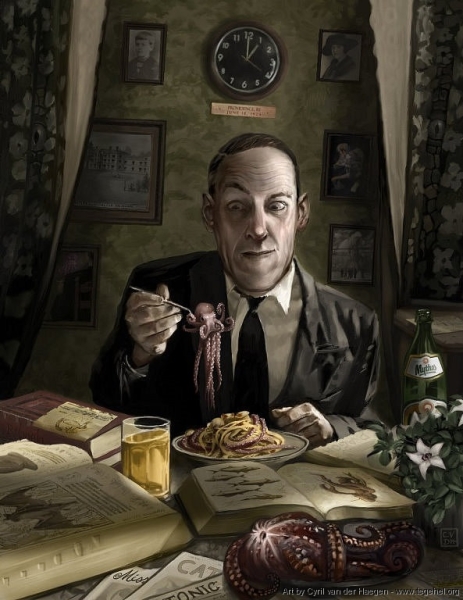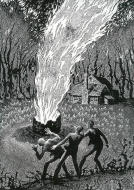Oooo...Lovecaft!
One the most original of the modern sci-fi/horror sub-genre writers. He basically created the category.
Grab yourself a heaping dish of
elder god sushi and settle in for some fun reading.

If the descriptions seem vague, the quotations from the
Necronomicon maddeningly short, the 'known' facts incomplete and sometimes even
contradictory, don't be surprised. Lovecraft deliberately wrote it that way. He firmly believed the reader's imagination could create a more frightening mood when working with hints than their rational mind could working with vivid descriptions. Besides, what description could accurately convey his idea of trans-dimensional, god-like, yet utterly evil
entities, whose presence phases in and out of our own time-space continuum.
That's the beauty of Lovecraft. The danger isn't confined to specific places or a times. The minions of Cthullu and the Elder Gods are separated from us by only the thinnest of dimensional walls. Do something wrong, or be a little too confident or careless, and the bogyman really will get you in Lovecraft's universe.
Lovecraft was an avid amateur astronomer. And he also lived at the very start of the era that produced the first real breakthroughs in nuclear energy, particle physics, and relativity. Fascinated as he was by all of this (and being a 'confirmed rationalist' by his own admission) he still admitted to an occasional vague anxiety about where this scientific research might lead mankind. Some of this anxiety, and his concerns about the possible societal reaction to Einstein's new vision of the universe, finds voice in some of his stories:
The sciences, each straining in its own direction, have hitherto harmed us little; but some day the piecing together of dissociated knowledge will open up such terrifying vistas of reality, and of our frightful position therein, that we shall either go mad from the revelation or flee from the deadly light into the peace and safety of a new dark age. -The Call of Cthullu
Interestingly, most of the people who run afoul of these entities in Lovecraft's stories did so by being a little too curious for their own good. They read a forbidden book they shouldn't have, conducted scientific research into something better left alone, played around with an artifact they knew was evil.
For example:
Possibly Gilman ought not to have studied so hard. Non-Euclidean calculus and quantum physics are enough to stretch any brain; and when one mixes them with folklore, and tries to trace a strange background of multi-dimensional reality behind the ghoulish hints of the Gothic tales and the wild whispers of the chimney-corner, one can hardly expect to be wholly free from mental tension.
But he was still content, for at one mighty venture he was to learn all. Damnation, he reflected, is but a word bandied about by those whose blindness leads them to condemn all who can see, even with a single eye. -Dreams in the Witch House
and...
If the thing did happen, then man must be prepared to accept notions of the cosmos, and of his own place in the seething vortex of time, whose merest mention is paralysing. He must, too, be placed on guard against a specific, lurking peril which, though it will never engulf the whole race, may impose monstrous and unguessable horrors upon certain venturesome members of it. -Through the Gates of the Silver Key
So what is this "specific lurking peril?"
In one of the few 'quotes' Lovecraft provides from the
Necronomicon he 'explains' a bit about what these entities are:
Nor is it to be thought that man is either the oldest or the last of earth’s masters, or that the common bulk of life and substances walks alone.
The Old Ones were, the Old Ones are, and the Old Ones shall be. Not in the spaces we know, but between them They walk, serene and primal, undimensioned and to us unseen.
Yog-Sothoth knows the gate. Yog-Sothoth is the gate. Yog-Sothoth is the key and guardian of the gate.
Past, present, future, all are one in Yog-Sothoth. He knows where the Old Ones broke through of old, and where They shall break through again. He knows where They have trod earth’s fields, and where They still tread them, and why no one can behold Them as They tread.
By Their smell can men sometimes know them near, but of Their semblance can no man know, saving only in the features of those They have begotten on mankind; and of those are there many sorts, differing in likeness from man’s truest eidolon to that shape without sight or substance which is Them.
They walk unseen and foul in lonely places where the Words have been spoken and the Rites howled through at their Seasons. The wind gibbers with Their voices, and the earth mutters with Their consciousness. They bend the forest and crush the city, yet may not forest or city behold the hand that smites.
Kadath in the cold waste hath known Them, and what man knows Kadath?
The ice desert of the South and the sunken isles of Ocean hold stones where Their seal is engraven, but who hath seen the deep frozen city or the sealed tower long garlanded with seaweed and barnacles?
Great Cthulhu is Their cousin, yet can he spy Them only dimly. Iä! Shub-Niggurath!
As a foulness shall ye know Them. Their hand is at your throats, yet ye see Them not; and Their habitation is even one with your guarded threshold.
Yog-Sothoth is the key to the gate, whereby the spheres meet.
Man rules now where They ruled once; They shall soon rule where man rules now.
After summer is winter, and after winter summer...
They wait patient and potent, for here shall They reign again.
So are these things gods? Alien intelligences? The ravings of some lunatics who make these things real only by their belief in in them and their willingness to act on what they believe are commands to serve them?
Who knows. And who cares?

Lovecraft deliberately puts his readers in the same position as the characters in his stories - confused and struggling to make sense out of something that is basically beyond the ability of the human mind to envision or understand. When Lovecraft talks about the 'unknown' he means the 'unknowable.'
Clark Ashton Smith, who was one of Lovecraft's proteges, wrote many stories using characters and concepts from the
Cthullu Mythos. Some years after Lovecraft's death he even tried to arrange the entities into a pantheon of sorts by assigning the various Elder Gods to an elemental framework:
Cthullu = water,
Hastur = fire,
Shub-Niggurath = earth, and
Ithaqua = air; and set them in an almost bibical "war in the heavens" backstory.
It didn't work.
I personally prefer Lovecraft's concept of something malignant and unknowable that forever hovers just on the fringe of our senses and subconscious awareness. Something as vague and immaterial as a half remembered nightmare. Something that may abruptly manifest itself and wreck havoc before vanishing just as quickly and without a trace.
Cool stuff.
Lovecraft's favorite story was
The Colour Out of Space. He felt that one best succeeded in capturing the sense of awe and fear someone might experience when confronting the completely 'unknowable' as opposed to the merely unknown.
My favorite too!
Here's Virgil Finlay's artwork for the story. (Finlay was Lovecraft's favorite illustrator.)
 What books are you reading?
What books are you reading? 
-----
P.S. Your objection to the plot problem in
The Call of Cthullu has bugged a lot of Lovecraft fans. I always wondered about that part myself even though there was an explanation (of sorts) in the story as to what had happened. A bit unsatisfying, but what can you do? <*sigh*>

